- Home
- Patricia Briggs
[Hurog 01] - Dragon Bones Page 3
[Hurog 01] - Dragon Bones Read online
Page 3
She nodded and stepped back from me, wiping her eyes briskly with her sleeves. Then she took a deep breath, wrinkled her nose because she’d obviously washed better than I’d had time to, and held out her hand imperially. I smiled, despite the events doubtlessly unfolding in the great hall below us, and offered her my arm. She took it and walked at my side down the stairs with the regal air she adopted in front of strangers and people she didn’t like.
THEY’D IMPROVISED A BED before the fireplace. My mother knelt beside it, her face pale and composed, though I could see she’d been crying. My father disliked tears.
Stala, the arms master, was still dressed in hunting clothes. She held her helmet in one hand and rested the other on my mother’s shoulder. Stala was my mother’s half sister. She was, as my father liked to brag, the greater part of my mother’s dowry and the main reason the Blue Guard kept its reputation during my father’s tenure.
She’d trained in the king’s army and served two terms of service before someone noticed she wasn’t a man. She returned to her family home, then followed Mother to Hurog when my father offered her the post of arms master when no other warlord in the country would have looked at her twice. Her hair was silver gray, but I remembered when it had been dark chestnut like Mother’s. Stala could best my father in everything but hand-to-hand wrestling.
There was sorrow on her face when she met my gaze, but her eyes were sharp with warning. When she saw she’d caught my eye, she carefully looked at my father’s wizard as he frantically scribbled on a piece of sheepskin.
I pulled the Brat with me to a place where my father could see us. His face was pale, his body more still than I’d ever seen it under the bloodstained blankets. Like Ciarra, he’d always seemed filled with boundless energy. Now the only thing alive about him was his eyes, which glared at me in futile anger, an anger that increased when he saw the silver-colored ring on my hand. I wondered if he really had given it to the family ghost to give to me or if Oreg had taken it from him.
I touched Stala’s shoulder. “What happened?” Unlike everyone else in the family, Stala always spoke to me as if I weren’t stupid. Partly, I suppose, because I could use a sword as well as any.
“Stygian was madder than usual,” said Stala, looking up at me, her voice expressing her distaste for my father’s mount. The stallion might well act wildly, but he had such power and speed I thought it was worth putting up with the rest. My aunt disagreed; she said that riding a horse like Stygian was akin to fighting with a flawed sword—it always broke when you needed it most. “He tossed the Hurogmeten onto a dead tree. None of the external wounds are serious, but it broke something inside. I’m amazed he’s survived so long.”
“Die at home like my father before me,” grunted the Hurogmeten, staring at me.
I’d never seen him look so old. It had seemed to me that my father always appeared a score of years younger than Mother, though he was actually older. This day he looked ancient, and my mother, next to his bed, looked no older than Ciarra.
“Bad enough to leave this to an oaf,” he said to me, “but still worse to die with my oaths undone. When you die, you will give to your heir what I have given you—swear it.” His speech was broken but nonetheless forceful for it.
He could only be talking about the ring. “Yes,” I said, rubbing it.
He gave his head a short nod, though he didn’t look relieved. “Good. Are you done yet, Licleng?”
“Yes, lord,” replied the wizard, spreading sand over his writings, then shaking the page and bringing it to my father.
No fool even on his deathbed, my father read the script. Then he gestured for the quill and signed his name with a bloodstained hand that shook so much his signature was mostly illegible.
“You’re too young to take care of Hurog. Too soft. Too stupid,” he told me. “Can’t do much about the softness, though I’ve tried—nor the stupidity.”
The stupidity is your fault, I thought, but I didn’t say it. When I was twelve, he’d beaten me senseless. When I recovered, I was changed, but not entirely in the way most people thought.
After drawing a couple more pain-filled breaths, my father said, “Should have married Stala instead of Muellen, but a young man is proud.” Mother made no sign that his words bothered her; she heard only what she wanted to. “The Hurogmeten can’t be marrying a peasant’s bastard, no matter who her father was. Can’t see any child of Stala’s being as soft as you. But my brother will rule Hurog until you’ve reached your twenty-first birthday—then Siphern’s wolves deliver poor Hurog.”
My father, the Hurogmeten, shoved the paper at the old wizard. The quill he crushed in a spasm of pain or spleen at the unfairness of a life that left him with his oldest son an idiot, younger son a runaway, and his daughter a mute. Too concerned with the present to worry about the future, I merely nodded my head in acknowledgment of what he’d said.
The Hurogmeten grinned malevolently at me despite the pain he must have felt. “The only thing I’ve left to you is Stygian. Knowing Duraugh, he’d have the beast killed. If you can’t ride him, use him for breeding stock.”
Stala snorted. “And breed that temper into all of his get—though I suppose none of your get ended up with yours.” I’d never been sure whether Stala disliked my father or just returned his spitefulness in kind. Certainly they’d been lovers for years, though I wasn’t sure if anyone but me knew that.
The Hurogmeten made a dismissing gesture with his right hand. “Duraugh?”
My uncle came forward, intent on the space where the Brat was. I stepped in front of him, blocking his way, before he could push her into the background. At something over fourteen stone, I was a good deal less movable than she.
Uncle Duraugh raised an eyebrow before he walked to the other side of the bed, edging in front of Mother. “Yes, Fen?”
“You’ll take care of Hurog.”
“Of course.”
“Good.” My father sighed. “Duraugh, Tosten will be Ward’s heir. Find him, wherever he is.”
“I know where he is,” I replied unwisely. But I couldn’t resist the impulse. It would be the only chance I’d ever have to hint to my father that he might be wrong about me.
The Hurogmeten looked at me, surprised. He’d beaten me until I bled when my younger brother had disappeared two years ago. Then he’d decided if I’d known anything about Tosten, I’d have told him; everyone knew I was too stupid to lie well.
“Where?” he asked, but I shook my head.
If my uncle knew where he was, Tosten would be yanked back here, and he wouldn’t want that. I’d come across him slitting his wrists one autumn night shortly after his fifteenth birthday and persuaded him that there was a better way to leave Hurog.
“He’s safe.” I hoped that was true.
He sighed again, closing his eyes. Abruptly, they opened again as he fought for air and lost a battle for the first time in his life.
Mother stood up. She hummed an eerie little melody, staring at his body for a moment, then she turned and left the room.
I felt lost and betrayed, as if I’d finally been winning a game at the expense of great effort and time, and my opponent left the playing field before he noticed I’d been winning. Which is, of course, what had happened.
Ciarra tightened her grip and leaned her cheek on my arm, her face a blank mask. My face, I knew from long practice, looked vaguely cowlike; the deep brown eyes Mother’d given me added to the general bovine appearance of my expression.
My uncle looked at me closely. “You do understand what has just happened?”
“The Hurogmeten is dead,” I replied.
“And you are the new Hurogmeten, but I’ll be holder in your place for two years.” Duraugh’s eyes hooded for a moment, and underneath the Hurog-stern face was excitement as well as grief. Duraugh wanted Hurog.
“I get father’s horse,” I said, having searched for the most inane comment I could make. “I’m going to go see him now.”
&nb
sp; “Change your clothes first,” suggested my uncle. “When you get back, your mother and I will have decided how to honor your father. We’ll have to call your brother home for the funeral.”
When I’m dead and buried, I thought, but I nodded anyway. “All right.”
I turned as if I’d forgotten the Brat on my arm. She stumbled, trying to keep up with me, so I shifted and hefted her under my arm, carrying her up the stairs at a rapid pace. She was really getting too old for that kind of play, but we both enjoyed it, and it reminded my fa—my uncle, just how strong I was. Part of the game, I thought, part of the game.
So did my uncle take my father’s place as my opponent.
2
Wardwick
I missed my father. I kept looking over my shoulder for him, though he was safely buried.
THE STABLEMEN WHO DRAGGED my father’s horse from the stall looked none too happy about it, but then neither did the horse.
“He ran back here some time before the hunting party returned, milord,” said my father’s stable master, Penrod. He was one of my mother’s imports, a Tallvenish flatlander. He’d ridden with the Blue Guard when my father had fought in the king’s battles the better part of two decades ago, before slipping into the position of stable master when the old one died. Unlike many of the higher-ranking keep folk, Penrod always treated me with the same deference he used with my father.
“We’re still trying to clean the blood off the Hurogmeten’s saddle,” he said. “I expect it’s the smell that’s kept Stygian so riled.”
My attention on the squealing and struggling stallion, I waited, Ciarra a small, observant shadow beside me. I could tell from his face that Penrod wanted to say something.
“He’s too good to put down, milord,” he said at last. “His sire was trade goods, and he died early, when your father used him to hunt bandits. We only have two of his get, and one of them was gelded before anyone realized the quality of the animals. The Hurogmeten . . .” He hesitated, perhaps remembering that I was now the Hurogmeten, at least in title. “Your father didn’t want to breed him yet, thought it would make him worse to handle than he already is. So if you kill him . . .” his voice took on the impassioned plea of an artist contemplating the destruction of his finest work.
“Kill him?” I asked, as if I’d only just heard him. “Why would I do a stupid thing like that?” I laughed inwardly as Penrod fought his tongue and won.
“I’m sure I don’t know, milord. But your uncle—he stopped in here just a few minutes ago. He thought it might be best.”
And suggested it to Penrod, in hopes the man might persuade me. Certainly any other stable master would have hated to have such an unpredictable monster in his keeping. But my uncle had misjudged the man. Penrod was a connoisseur of horses and a good enough horseman to see that most of Stygian’s madness was man-made. It would have broken his heart to kill the stallion.
I shook my head, outwardly dismissing my uncle. “No.”
My father had been a rider without peer. He could stay on the worst rogue and make it do anything he wanted. He preferred to ride them until he’d battered their spirit until a lesser man could handle them. Once that was done, he’d find a different mount, or at least he had until he’d ridden Stygian. The stallion had fought him for four years, emerging, today, the victor at last.
Three softly cursing grooms struggled to hold the animal still for my inspection. It was a battle, despite the halter they had on him. Meant to control a lusting stallion, it had dull metal buttons in places that would inflict pain when the horse pulled against it. A chain wrapped around his nose could close off his breathing and drop him unconscious, if necessary.
Stygian was massive; it made him appear slow, which he actually wasn’t. He was rather quicker in turning (and bucking) than in forward movement, but he’d do very well. Most animals of his build aren’t much for endurance, either, but my father used to ride Stygian when his men went through two rotations of horses to keep up. He was a dark, muddy color that lightened on his belly, flanks, and nose to a rusty brown. There were other lighter patches of color near his flanks and on his barrel due to years of whip and spur.
“His bridle and saddle are here, milord. If you want to ride.” Satisfied I wasn’t going to kill the horse, Penrod had settled into his normal, respectful self. “Though it might be better just to turn him out.” He cleared his throat. “I suggested putting him into a breeding program, but your uncle said he wouldn’t have it as long as he held Hurog, said Stygian’s temperament shouldn’t be passed on.”
“Can’t breed him then,” I said regretfully.
Penrod’s respectful face often led smarter men than my uncle into believing that the stable master agreed with them—my father, for instance. Duraugh had probably left thinking Penrod would urge me to put Stygian down. My uncle’s misjudgment might as well be turned to my good. If my uncle did well over the next two years, he would certainly win the support of the castle folk if he decided to take my place.
It wouldn’t hurt to win over a few loyal men myself. Penrod already liked me, more because of how I treated his charges than anything personal. He was a smart man, or he’d never have survived in his position, given how far apart his ideas and my father’s had been.
“Might shift his stall around,” I said after a bit. “His is dark. Small. I don’t like small places; maybe he doesn’t either.” The sewer today had decided that.
The stablemen were getting tired, but so was the horse. He’d already had quite a ride. I owed the stallion for his efforts today. I wondered why I wasn’t happier about it.
“That stall’s the only one we could keep him in,” explained Penrod as if I didn’t know.
“The big run by the old stables is built to hold stallions,” I said. Then, in case he didn’t understand, I continued, “Have to be careful the side gate’s latch is secure.”
He stood perfectly still for a moment, ostensibly watching the horse. Then he looked at me. The stallion’s paddock was used for loose breeding and shared a fence line with the mares’ fields. If someone accidentally (or on purpose) left the side gate open, Stygian would breed whatever mares happened to be in season.
I could have left it there. He’d understood the implications well enough, but I needed him. My uncle would have two years to win my people. I would have to make sure that when the time came, Hurog’s people would listen to me and not my uncle. For that, I needed Penrod to know that I might be more than they’d given me credit for, so I winked at him.
Penrod stiffened even further, shocked into turning from the horse to stare at me for a moment. It must be hard to change one’s opinion of someone so quickly, but he had the added incentive of the carrot I offered him. He looked at the dark horse again.
“I’ll see that he’s put out in the paddock because you think that, like you, he doesn’t like small, enclosed places.” Underneath Penrod’s bland voice vibrated a taut, fierce joy.
“Dark,” I muttered. “Don’t like dark.”
“Right,” he said with a small smile.
Once he followed my orders to disobey my uncle, he was mine. With him would come the rest of the stablemen. It would mean that eventually everyone would know I was not so stupid, but I wasn’t sure stupidity was still in my best interest. The playing field was changing.
I frowned at my father’s horse. “Stygian’s too hard to say.” There was a flower in one of Mother’s gardens that was about the same color as Stygian. I had to wait a while longer until my lips quit trying to smile at the thought of what my father would have said before I spoke.
“I’ll call him Pansy,” I said blandly.
Ciarra pulled away and turned to face me, her expression so incredulous it needed no words.
“Mother has a flower in her garden his color. I asked her what it was,” I explained.
“Pansy,” said Penrod stiffly, doubtless thinking about how it would look on a pedigree. Then, abruptly, he smiled. He nodded his head at th
e three tense-faced stablemen holding the stallion. “Hard to be scared of something named Pansy.”
I nodded abruptly and called to the grooms, “Put him in the round corral, then take off the halter.” I turned to Penrod. “I need a long whip, like the ones we use to train the youngsters. And I need five or six copper pots. You can send someone to the kitchens. And an empty grain sack.”
I’d had a long time to think about what to do about Stygian . . . Pansy. No sense waiting until my father was cold to steal his horse. Some dark emotion twisted my mouth before I could banish it. I would not grieve for my father. I would not. Instead, I would spend the afternoon making his horse mine.
IN THE TRAINING RING, Stygian stayed as far away from me as he could, which was fine with me for now. Four years wasn’t to be undone in an afternoon—or a dozen afternoons. But I might make headway if I was lucky.
I held the sack of pots in one hand, careful that they made no noise. With my other hand I held a whip twice as long as I was tall. Half the length was stick from which the whipcord dangled.
“Let’s go,” I said without undue emphasis once I was in the center of the ring. At the same time, I shook out the whip, and the stallion took off at a dead run after aiming a kick somewhere in my general direction.
I let him run a dozen times around the smallish pen. He thought he knew what this was about. All my father’s horses started in this ring to learn simple commands like walk and whoa. But I’d brought him here to learn a different lesson, I hoped.
He started to slow to a canter, more because it was hard for a horse with his stride to gallop around such a small enclosure than because he was tiring.
“Let’s go,” I said again and waved the whip in his face. A green horse would have turned around and run the other way, but he’d learned too much about whips. He flattened his ears and reared at me; then, in case I didn’t get the message, he charged.

 Wolfsbane
Wolfsbane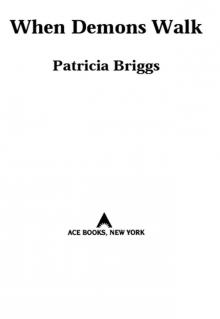 When Demons Walk
When Demons Walk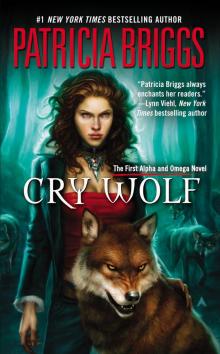 Cry Wolf
Cry Wolf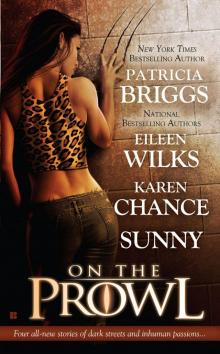 On the Prowl
On the Prowl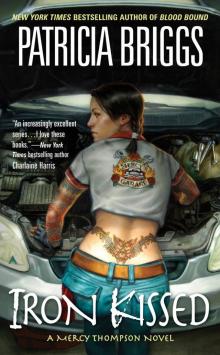 Iron Kissed
Iron Kissed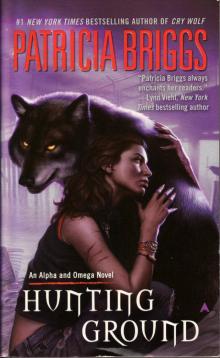 Hunting Ground
Hunting Ground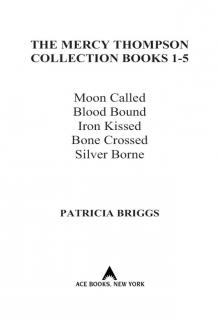 Patricia Briggs Mercy Thompson: Hopcross Jilly
Patricia Briggs Mercy Thompson: Hopcross Jilly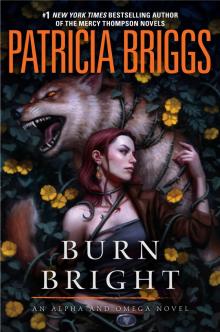 Burn Bright
Burn Bright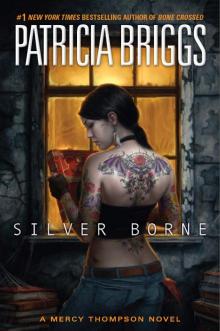 Silver Borne
Silver Borne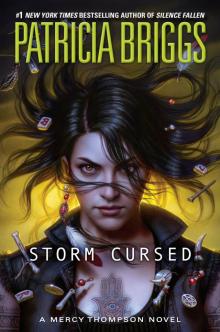 Storm Cursed
Storm Cursed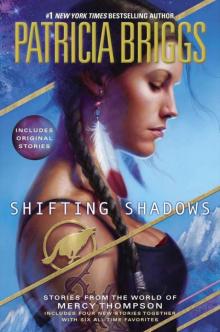 Shifting Shadows
Shifting Shadows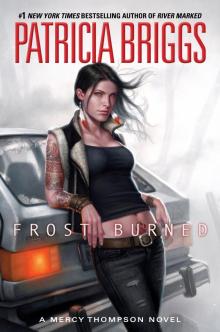 Frost Burned
Frost Burned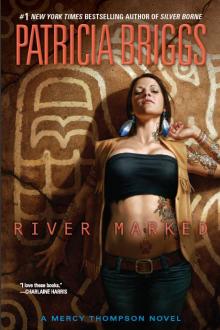 River Marked
River Marked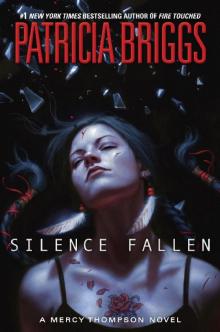 Silence Fallen
Silence Fallen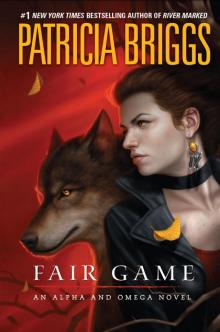 Fair Game
Fair Game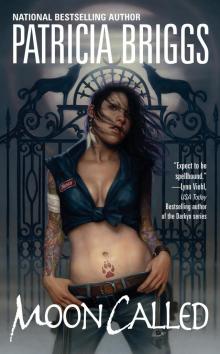 Moon Called
Moon Called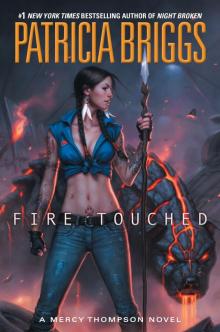 Fire Touched
Fire Touched Dead Heat
Dead Heat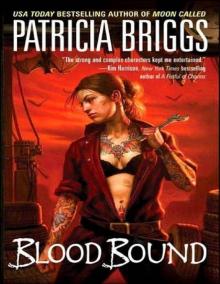 Blood Bound
Blood Bound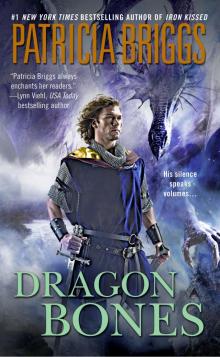 Dragon Bones
Dragon Bones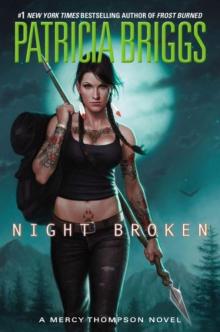 Night Broken
Night Broken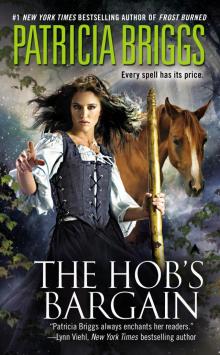 The Hobs Bargain
The Hobs Bargain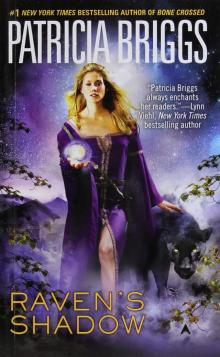 Ravens Shadow
Ravens Shadow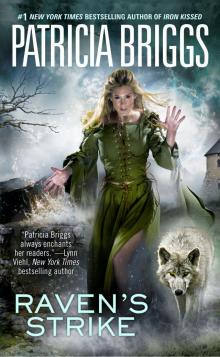 Ravens Strike
Ravens Strike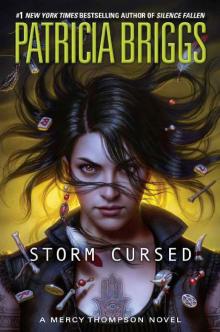 Storm Cursed (A Mercy Thompson Novel)
Storm Cursed (A Mercy Thompson Novel)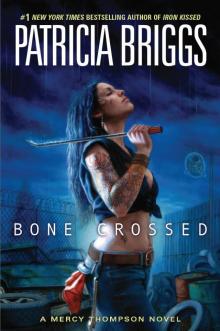 Bone Crossed
Bone Crossed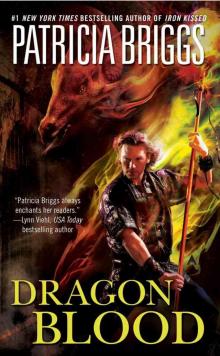 Dragon Blood
Dragon Blood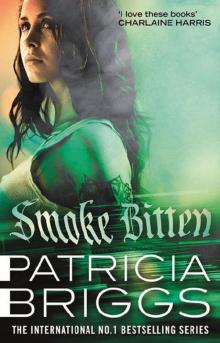 Smoke Bitten: Mercy Thompson: Book 12
Smoke Bitten: Mercy Thompson: Book 12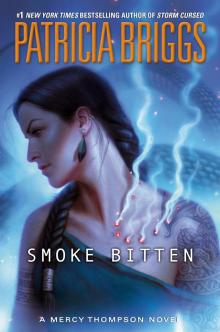 Smoke Bitten
Smoke Bitten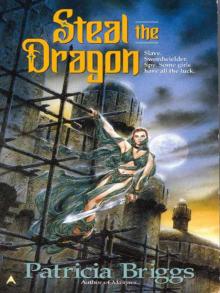 Steal the Dragon
Steal the Dragon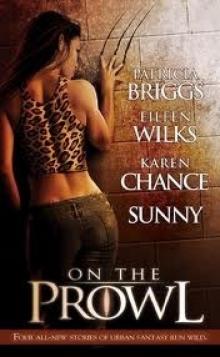 0.5 On The Prowl (alpha and omega)
0.5 On The Prowl (alpha and omega)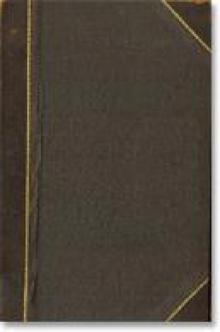 Alpha and Omega
Alpha and Omega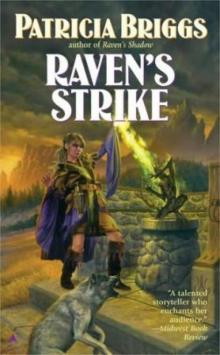 Raven's Strike rd-2
Raven's Strike rd-2![[Mercy 03] - Iron Kissed Read online](http://i1.bookreadfree.com/i/03/24/mercy_03_-_iron_kissed_preview.jpg) [Mercy 03] - Iron Kissed
[Mercy 03] - Iron Kissed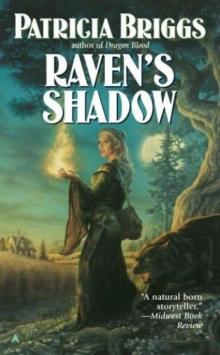 Raven's Shadow rd-1
Raven's Shadow rd-1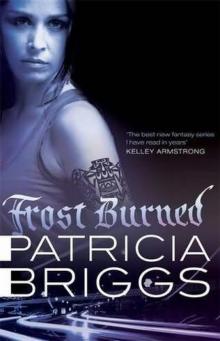 Frost Burned mt-7
Frost Burned mt-7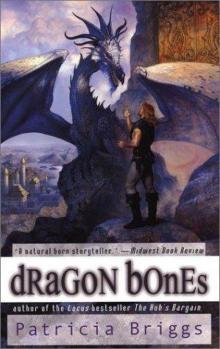 Dragon Bones h-1
Dragon Bones h-1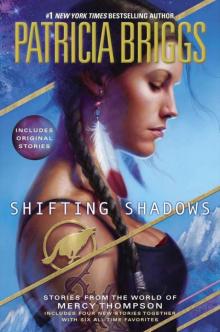 Shifting Shadows: Stories from the World of Mercy Thompson
Shifting Shadows: Stories from the World of Mercy Thompson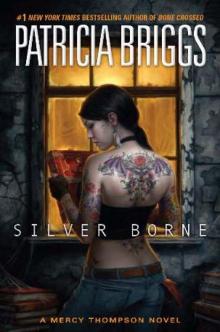 Silver Borne mt-5
Silver Borne mt-5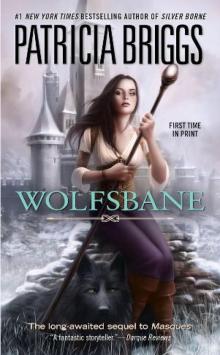 Wolfsbane s-2
Wolfsbane s-2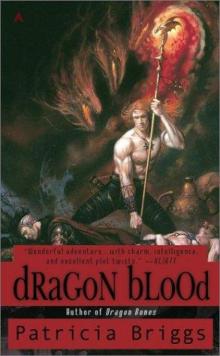 Dragon Blood h-2
Dragon Blood h-2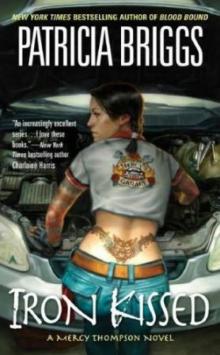 Iron Kissed mt-3
Iron Kissed mt-3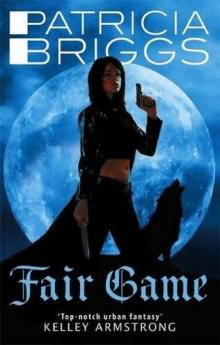 Fair Game aao-3
Fair Game aao-3 Masques s-1
Masques s-1![[Hurog 01] - Dragon Bones Read online](http://i1.bookreadfree.com/i1/04/03/hurog_01_-_dragon_bones_preview.jpg) [Hurog 01] - Dragon Bones
[Hurog 01] - Dragon Bones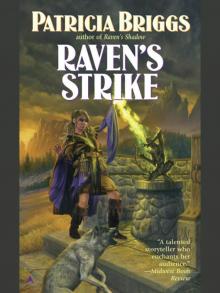 Raven s Strike
Raven s Strike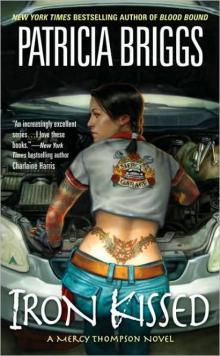 Mercedes Thompson 03: Iron Kissed
Mercedes Thompson 03: Iron Kissed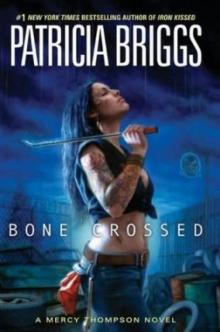 Bone Crossed mt-4
Bone Crossed mt-4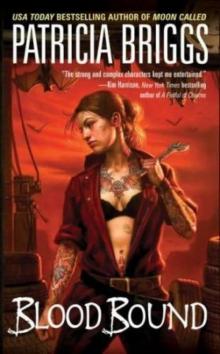 Blood Bound mt-2
Blood Bound mt-2![[Mercy 01] - Moon Called Read online](http://i1.bookreadfree.com/i2/04/09/mercy_01_-_moon_called_preview.jpg) [Mercy 01] - Moon Called
[Mercy 01] - Moon Called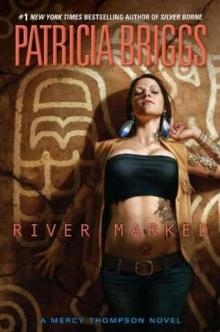 River Marked mt-6
River Marked mt-6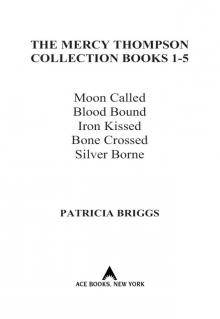 The Mercy Thompson Collection
The Mercy Thompson Collection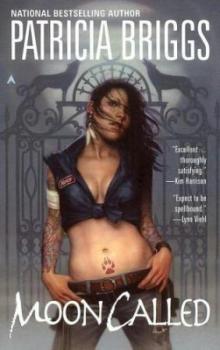 Moon Called mt-1
Moon Called mt-1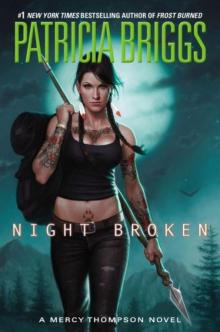 Mercy Thompson 8: Night Broken
Mercy Thompson 8: Night Broken